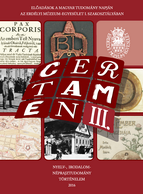Posztmodern cselédsors?
Postmodern Servants?
Domestic Workers and Eldercare Workers from Transylvania in West
Author(s): Angella SorbánSubject(s): Sociology
Published by: Erdélyi Múzeum-Egyesület
Keywords: transnational migration of women: domestic work; care workers; structural changes
Summary/Abstract: Taking notice of the feminization of international migration, which has become obvious at the turn of the millennium, the paper discusses the issues of female foreign workers. Our starting point is that the tasks of Transylvanian women who decide to work abroad mostly consist of domestic works and elderly care, this study focuses on this type of work and the specific cultural exchange related to it. We present these feminine tasks in the frames of the notion global care chains (Hochschild 2000, Parrenas, 2001). Particular for the caring chains is, on one hand, that it reveals and also reproduces a whole series of social inequalities, on the other hand – as the metaphor of the chain plastically suggests – that it means a double-directional emotional and moral burden accompanying the work, which emphatically affects the women who are in the middle of such a chain. A typical phenomenon related to this topic is the export of Transylvanian specific into the emigration. This means that many Transylvanian women care abroad for elderly people – originating from Hungarian, Swabian, Saxonian or Jewish communities – who left Transylvania themselves or who have been taken to other countries by their children. These seniors feel like home thank to the Transylvanian specific provided by the female foreign workers, and for these women it is a significant advantage that they can use their mother tongue at work. Therefore, in this kind of caring chain the Transylvanian culture itself plays an important role. Regarding all the mentioned aspects, we can affirm that the particularities of female foreign work (the widespread task of elderly care, the extension of active working age, the presence of typically feminine networks within the system of migration etc.) place the changes of social structures in a new light, which can be defined by many aspects relevant for gender studies.
Journal: Certamen
- Issue Year: 2016
- Issue No: III
- Page Range: 45-59
- Page Count: 15
- Language: Hungarian

